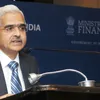Coronavirus: Niti Aayog hails RBI's move to deal with COVID-19 impact on economy
Niti Aayog vice chairman Rajiv Kumar on Friday welcomed steps taken by the RBI to counter negative impact of the coronovirus pandemic, saying the central bank's decision to cut key policy rates will lower cost of capital.
Niti Aayog Vice Chairman Rajiv Kumar on Friday welcomed steps taken by the RBI to counter negative impact of the coronovirus pandemic, saying the central bank's decision to cut key policy rates will lower cost of capital.
"The RBI has taken exceptionally build measures to counter the negative economic impact of CoronaVirus. By cutting the repo rate by 75 bps & the reverse repo by 90 basis points, it has lowered the cost of capital & also tried to ensure that banks will be incentivised to lend," Kumar said in a tweet.

"Deferment of debt repayment will also greatly reduce the cash flow crunch that businesses are facing. Kudos to the Governor, MPC and his team," he added.
Niti Aayog CEO Amitabh Kant also said the RBI has taken progressive and timely measures by giving three months moratorium on payments of term loan instalments (EMI) & much-desired relief on interest on working capital.
Slashing repo rate & reverse repo rate will infuse liquidity. Big, bold steps, Kant added.
The RBI on Friday put on hold EMI payments on all term loans for three months and cut interest rate by steepest in more than 11 years as it joined the government's efforts to rescue a slowing economy that has now got caught in coronavirus whirlwind.
The Reserve Bank of India (RBI) cut repo to 4.4 percent, the lowest in at least 15 years. Also, it reduced the cash reserve ratio maintained by the banks for the first time in over seven years. CRR for all banks was cut by 100 basis points to release Rs 1.37 lakh crore across banking system.
The reverse repo rate was cut by 90 bps to 4 percent, creating an asymmetrical corridor.
RBI Governor Shaktikanta Das predicted a big global recession and said India will not be immune.
It all depends how India responds to the situation, he said.
(Edited by Javed Gaihlot)








